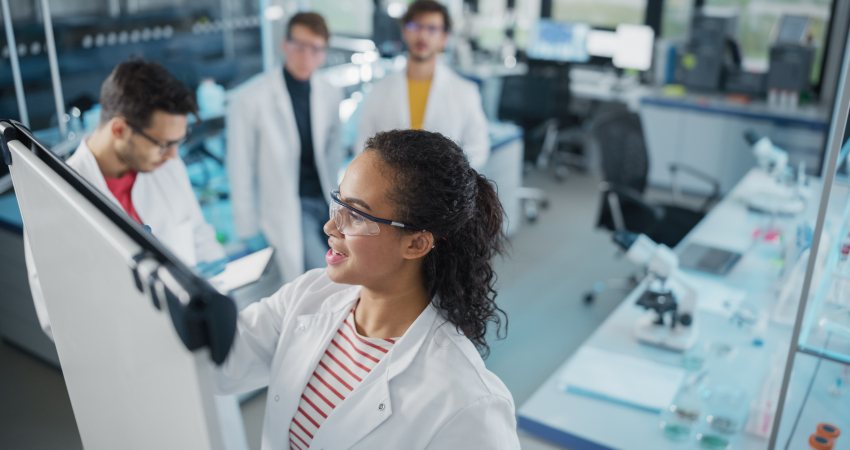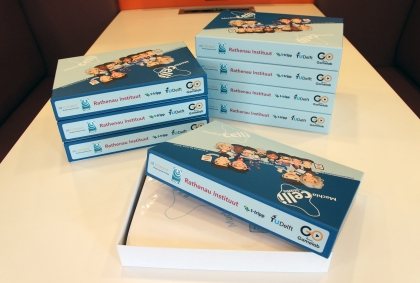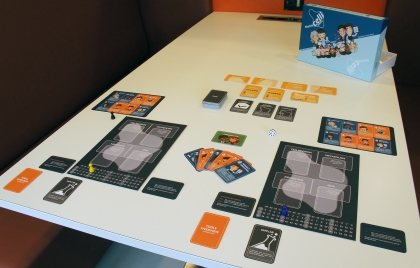Biotechnology and safety
Picture: Gorodenkoff/Shutterstock

Opportunities and risks
The government wants to exploit the innovation opportunities of biotechnology and, therefore, stimulates biotechnology by means of subsidy programmes for research and development. However, in addition to advantages and opportunities, the development of new biotechnology also involves risks. Think of safety risks, such as the escape of a genetically modified organism from a lab. Environmental risks or biodiversity risks can also occur. Think of a genetically modified plant that is so strong that all other plants of that species die out as a result. There could also be social consequences for a society. For example, when one company is the owner of all these "super seeds" and has complete authority over them.
The importance of government policy
Good government policy should make it possible for society to benefit from technological developments and minimise the negative consequences of its associated risks. But that is not an easy task. In recent years, government policy on biotechnology has been challenged in various ways:
- The pace of innovation in biotechnology is high. As a result, among politicians and policy makers, as well as scientists, often very little is known about new biotechnology and its associated risks for people and the environment.
- Modern biotechnology deals with complex living systems (at genetic, cellular, organism and ecosystem level) that can spread and evolve. This makes it difficult, if not impossible, to predict all possible risks.
- Social and cultural issues often play a role in the societal application and acceptance of biotechnology. The government must take this into account as well.
Biotechnology in a broader sense means the application of (scientific) knowledge from biology by using it for practical purposes with the help of technology. There are various types of biotechnology. The distinction is made on the basis of the practical purpose of the technology. The different types are often indicated by a colour. We will now mention the four best known types or colours, but this overview is not all-encompassing. In addition, the division between the various types cannot always be made clearly.
Red biotechnology stands for the medical field. Think of the development of vaccines, medicines and diagnostic tests with the help of biotechnology.
White or industrial biotechnology refers to the use of biotechnology to process and produce chemicals, materials, the building blocks for medicines and energy. Examples include enzymes in detergents, chemical building blocks for polymers, oil for cosmetics and proteins in food.
Green biotechnology includes agricultural and food applications. Examples include genetically modified soya and cheese rennet that does not come from a cow's stomach, but is made by modified bacteria.
Blue biotechnology refers to marine biotechnology. Think of genetically modified bacteria that purify water or break down waste. Or genetically modified algae that make building blocks for medicines or biofuels.
Research for a future-proof safety policy
The difficulty of assessing the risks of modern biotechnology prompts the question: how can biotechnology be developed in a safe and socially responsible manner? The Rathenau Instituut is working on a number of projects researching safety in biotechnology. One of these projects is the T-TRIPP project (read: Tools for Translating Risk research into Policies and Practices).
The aim of the T-TRIPP project is to strengthen cooperation and communication between scientists working on safety in biotechnology and policy makers. This cooperation is important if we want to benefit from the opportunities of biotechnology in the future and at the same time guarantee safety. After all, in order to make policy, the government needs up-to-date knowledge about the risks of biotechnology. This knowledge can be produced by the researcher. And subsequently, the government can learn from this new knowledge and incorporate it into safety policy, so that it matches the rapid developments in biotechnology.
Consortium
The T-TRIPP project is a collaboration between the Rathenau Instituut, the Biotechnology and Society department, and the Multi Actor Systems and GameLab department of the TU Delft. T-TRIPP stands for Tools for Translation of Risk Research into Policies and Practices. Two experts are also involved in this project: Huib de Vriend of LIS Consult and Tim Trevan of BioChrome Management.
Funding
The T-TRIPP project is funded as part of the NWO programme 'Towards Modernisation of Biotechnology and Safety', which was commissioned by the Ministry of Infrastructure and Water Management. The research programme started in 2018 and its main objective is to build scientific knowledge on the risks and uncertainties of future biotechnology developments and applications. And to gain knowledge on ways to minimise and manage risks.
User committee
T-TRIPP has a user committee with representatives from companies and public organisations that can make use of the research results in practice. The members of the T-TRIPP committee work among others at the National Institute for Public Health and the Environment (RIVM), the Ministry of Infrastructure and Water Management (I&W), the Netherlands Commission on Genetic Modification (COGEM), the iGEM Foundation, The International Federation of Biosafety Association (IFBA), Delft University of Technology, Wageningen University & Research, and the Pakistan Biological Safety Association. During meetings, researchers and the committee exchange ideas about the progress of research and about opportunities for adding value.
Tools for ‘translating’ risk research into policy and practice
New developments raise new questions for policy. How can innovations and the risks associated with them be incorporated into the existing framework of rules for biotechnology? Or do new developments necessitate adjustments to the current regulations? Both scientists and policy makers can play a role in answering these questions. In order for this cooperation to run smoothly, the knowledge that is shared must be regularly 'translated'. So that it is understandable and applicable to the different areas where it is needed.
Scientists cannot tell how safe is 'safe enough'. They can, however, provide the data needed to assess risks and the methods used to do so. This data needs to be interpreted and transformed into policy. And vice versa, a question from policy needs to be 'translated' into a question that can be understood and answered by science. The T-TRIPP project supports this translation by providing insight into the learning process between research and policy, and by developing instruments to guide and reinforce this learning process. We do this in the following three ways:
1. A report for insight and policy options
On the basis of literature, interviews and workshops, the T-TRIPP project maps out who are involved in the development and implementation of safety policy in biotechnology and what is the interaction between the different actors and institutions? In doing so, we look specifically at the interactions between the science and policy domain. In this way we provide a better understanding of the cooperation and communication between research and policy, and we formulate recommendations that strengthen these interactions. All these insights and recommendations are compiled in a report.
2. A protocol for social learning
Based on the insights from the study, we are developing a protocol for social learning. Our study showed that there was still too little cooperation between research and policy. This can lead to frustration, because the different groups do not understand each other. To reduce this tension, we are developing a protocol that enables and supports interaction between different stakeholders. This protocol also helps to increase understanding of each other's values and perspectives on risk-related issues.
3. Serious games for mutual understanding and safety awareness

In addition, within the T-TRIPP project we are developing three serious games. These are games that are not only intended for fun and entertainment. The main aim is to teach players something, to make them aware of something or get them talking about something. The different games within this project each strengthen the cooperation between research and policy in their own way.
The first two board games, called MachiaCelli Switch and MachiaCelli Teams, encourage cooperation between researchers and policymakers. By playing the games, players experience a biotechnological project from the perspective of both scientists and policymakers. Within the game, they switch roles or work together as a team.

In our research, we saw a lack of safety awareness among junior researchers. To show these researchers that biosafety can be fun, we created the third game, 'Cards for biosafety', which teaches researchers about biosafety. This is done by challenging and rewarding each other to choose the most appropriate (or creative) measure for a certain risk.
Download Cards for Biosafety
Interested to learn more about Cards for Biosafety? Read the article below or download the files and print your own Cards for Biosafety.
How do we move forward?
All these different components that we developed within this project help to guide and strengthen the mutual learning process between research and policy. In this way, we hope to create a space in which researchers, policy makers, and risk assessors, among others, can jointly learn and reflect on what is needed to ensure safety in biotechnology in the future. In the near future, we will publish the results of the serious games, the protocol, and our research on this page.
- Bouchaut, B., Asveld, L. (2021). Responsible Learning about Risks Arising from Emerging Biotechnologies. Science and Engineering Ethics 27 (2) 1-20. https://doi.org/10.1007/s11948-021-00300-1
- Bouchaut, B., Asveld, L., Hanefeld, U., Vlierboom, A. (2021). Value Conflicts in Designing for Safety: Distinguishing Applications of Safe-by-Design and the Inherent Safety Principles. International Journal of Environmental Research and Public Health 18 (4) 1963. https://doi.org/10.3390/ijerph18041963
- Bouchaut, B., Asveld, L. (2020). Safe-by-Design: Stakeholders’ Perceptions and Expectations of How to Deal with Uncertain Risks of Emerging Biotechnologies in the Netherlands. Risk Analysis 40 (8), 1632-1644. https://doi.org/10.1111/risa.13501
- Bouchaut, B., Asveld, L. & Hanefeld, U. ‘Veilige en Duurzame (Bio)Chemie met Blauwzuur?’ Report commissioned by the Dutch Ministry of Infrastructure and Water management, The Hague, the Netherlands, December 2019. Report available via https://www.rijksoverheid.nl/documenten/rapporten/2019/12/15/veilige-en-duurzame-biochemie-met-blauwzuur.
- Freese, M. & Lukosch, H. K. (2021). The Funnel of Game Design - Proposing a new way to address a problem definition using the IDEAS approach. In: Wardaszko, M. (ed.): Simulation & Gaming. Through Times and Disciplines. Proceedings of the 50th Annual Conference of the International Simulation and Gaming Association (ISAGA), Warsaw (PL), 26.-30.8.2019, 170-180. ISBN: 978-3-030-72132-9. https://doi.org/10.1007/978-3-030-72132-9_16
- Freese, M., Tiemersma, S., & Verbraeck, A. (2021). “Risk management can actually be fun” – Using the serious Cards for Biosafety game to stimulate proper discussions about biosafety. In Proceedings of the 51st International Simulation and Gaming Association’s Conference, online, September, 2021.
- Freese, M., Lukosch, H., & Tiemersma, S. (2020). From Entertainment to Seriousness – How to translate Entertainment Games into Simulation Games? ZMS-Schriftenreihe, 12, Norderstedt: Book on Demand GmbH.
- Freese, M., & Lukosch, H. (2019, in press). Current versus future Technologies, Regulations and Risks – A Serious Game for Biotechnology. Lausitzer Verlag für Wirtschafts- und Sozialwissenschaften.
- Bouchaut, B. Nederlandse Vereniging voor Bio-ethiek – Verantwoord leren over onzekere risico’s in biotechnologie. Podium voor Bio-ethiek, December 2021 (in druk)
- Dagblad Trouw – Opinion ‘Recycling moet veilig gebeuren, anders haken burgers af’ by Lotte Asveld, Britte Bouchaut & Frank Hollmann, February 24, 2021. Available via https://www.trouw.nl/opinie/recycling-moet-veilig-gebeuren-anders-haken-burgers-af~b3be8cef7/
-
A Workshop on the basis of the MachiaCelli-game to illustrate and discuss the role of games in risk research held by Maria Freese at SAGSAGA (Swiss Austrian German Simulation And Gaming Association) network meeting, Zittau, Germany, 02/2019
-
A Workshop on the basis of the MachiaCelli-game to show and discuss the further development of the serious game with gaming experts held by Maria Freese and Heide Lukosch at EPF (European Gaming and Simulation Forum), Stuttgart, Germany, 06/2019
-
A Workshop held by Maria Freese and Simon Tiemersma at NWO Life Sciences, Bunnik, the Netherlands, 29.05.2019 (invited by organizers)
-
A Workshop held by Maria Freese, Simon Tiemersma, Lilian van Hove, Britte Bouchaut at iGEM meet up, Den Haag, the Netherlands, 13.06.2019 (invited by organizers
-
A game session held by Maria Freese, Simon Tiemersma, Britte Bouchaut, Lotte Asveld at Biotechnology symposium, Schipluiden, the Netherlands, 23.09.2019
-
A workshop held by Maria Freese, Simon Tiemersma and Michelle Habets in Amersfoort at the NWO-TTW Teknowlogy festival, 07.11.19
-
A virtual Cards for Biosafety workshop held by Maria Freese and Doris Boschma during the International Simulation and Game Association’s conference, 09/2021
- ‘Biosafety by Design: Mere Control or Room for Serendipity?’ Symposium by Britte Bouchaut, Lotte Asveld, Laurens Landeweerd, Ruth Mampuys, Vitor Martins Dos Santos, Kyra Delsing and Dirk Stemerding at 4TU.Ethics bi-annual Conference on Ethics and Technology ‘It’s Alive!’, Wageningen University, Wageningen, the Netherlands, October 2021.
- ‘Value Conflicts in Designing for Safety: A Case Study of Miniaturization Processes using Hydrogen Cyanide’ Oral presentation at the Society for Risk Analysis-Europe (SRA-E) Benelux Conference – Eindhoven University of Technology, Eindhoven, the Netherlands, March 2021.
- ‘The Thinkers and the Doers: Safe-by-Design as Operationalization of the Precautionary Principle’ Oral presentation at 4TU.Ethics Conference on the ‘Ethics of Disruptive Technologies’ - Eindhoven University of Technology, Eindhoven, the Netherlands, November 2019.
- ‘Safe-by-design: Perceptions and expectations of how to deal with risks of emerging biotechnologies. Findings and next steps’ Oral presentation at Netherlands Biotechnology Congress – The sound of Biotech, Ede, the Netherlands, May 2019
- ‘Safe-by-design: Perceptions and expectations of how to deal with risks of emerging biotechnologies. Findings and next steps’ Oral presentation at the 25th SPRU PhD Forum - University of Sussex, Falmer, Brighton, United Kingdom, May 2019.
- ‘Perceptions of Inherent Safety: A comparison study from the bioengineering field’ Oral presentation at the 19th International Conference on Systems Biology (ICSB), Lyon, France, October 2018.
- ‘Perceptions of Inherent Safety: A comparison study from the bioengineering field’ Oral presentation at S.NET Conference, Maastricht, the Netherlands, June 2018.
